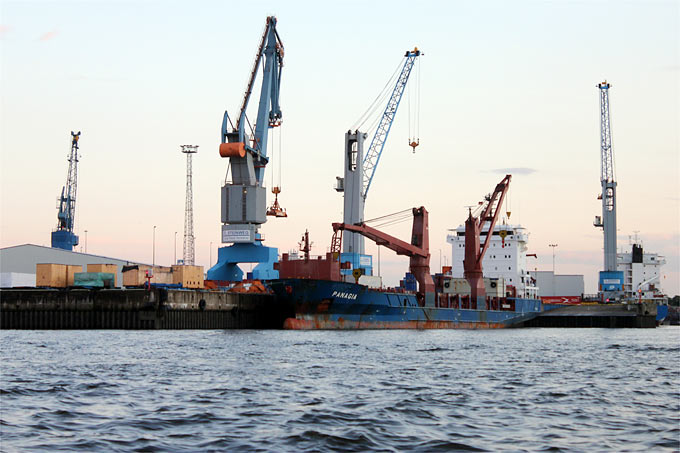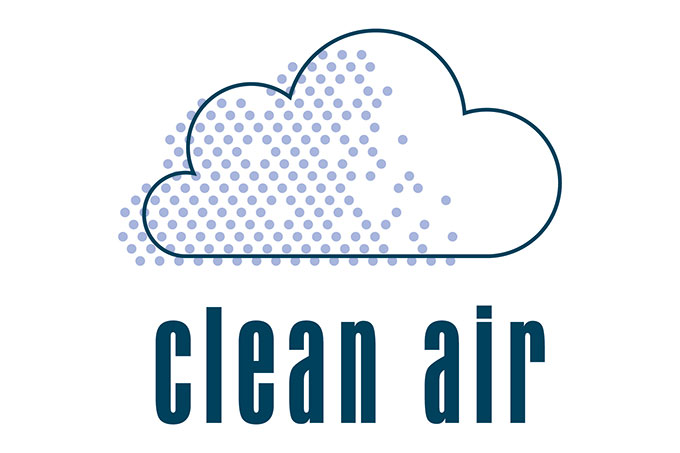Clean Air in Ports: Copenhagen
Fourth Workshop on June 4th 2014
On June 4th the fourth "Clean Air in Ports“ event was performed in the European “Green Capital 2014” Copenhagen, in a room of the Danish Parliament in Christiansborg.
The agenda for the day contained several speakers about air pollution in ports and contributions from politicians. First, Helge Roerdam Olesen, senior advisor at the Danish University of Aarhus, explained some general background of air pollution from ships and then the effects of air pollution from the port of Copenhagen on the city air quality. Professor Dr. Jeroen Buters from the Virtual Helmholtz Institute in Munich (Germany), presented recent results from his project were living lung cells had been exposed directly to exhaust gases from ships. The scientific results proof the negative impact of fuel emissions on the condition of the cells. Since the emissions from Marine Diesel Oil (MDO) also set free many emissions (PM and PN), NABU feels backed up in its demand that ships not only switch to a better fuel but also to are (retro) fitted with soot particle filters.
Dr. Eick von Ruschkowski, head of the NABU-Department for Nature Conservation and Environmental Policy, gave an overview about general EU regulation on air pollution concerning emissions sources in ports such as ships, trucks and non-road mobile machineries (NRMM). In his assessment he pointed out that the current EU regulations are not strict enough but ports have many possibilities to act ahead of them. The topic was followed up in the next presentation by Bjarne Løf Henriksen, senior consultant from Danish Ports, who gave an overview about the environmental performance and potentials of ports.
The keynote speaker of the conference, the Danish Minister for Environment, Kirsten Brosbøl, shared the view that ports and shipping industry considerably contribute to air pollution in ports and port cities and thus clearly have the responsibility to take measures aigainst it, but she also committed herself to support action in that regard. Several best practice examples for cleaner air in ports were shown by Jan Henrik Pietsch from terminal operator HHLA from Hamburg (Germany). Those are for example automatic guided vehicles (AGVs) and measures to either reduce energy consumption or generate renewable energy in a port.
Claus Nikolajsen, vice president of Scandlines Ferries, presented approaches for low and zero emission ferries. Hybrid ferries (diesel-electric) are already in operation while LNG-ferries are about to be finished and zero emission (electric) ferries are in a planning phase. The framework and conditions for shore power facilities for ships were explained in the presentation from Christian B. Petersen, a sales engineer at ABB . Eelco Leemans, director of the Dutch “North Sea Foundation” presented different environmental ship indices as tools to incentivise a reduction of air pollution, again pointing out that initiatives on EU level on that issue are too weak.
The day was completed by a discussion between and with members of the Folketing, the Danish parliament on how Danish politicians and politics can stimulate cleaner air in ports and ports cities.
The event was organized by NABU, the Danish Ecological Council, as well as several further associations, institutions and authorities like Danish Ports, Danish Shipowners Association, Danish Society for Naval Architecture and Marine Engineering, Danish Environmental Protection Agency, Danish Maritime Authority, IDA Green Technology, Transport Innovation Network, The Industrial Association Danish Maritime, Green Ships of the Future and the University of Aalborg
The event was funded by
EU LIFE + project “Clean Air in Ports”, EU INTERREG NSR Interreg project S@IL, the Danish Maritime Fund, Society for Naval Architecture and Maritime Engineering Foundation, The Danish Energy Foundation, University of Aalborg, European “Soot-free for the climate” campaign.
The presentations and the agenda of the workshop can be downloaded here:
All results of the workshops were integrated into the working paper of the project, that in May 2015 was turned into a manual.
More Information
In ports the air is often more contaminated than elsewhere. Ships, shunting locomotives, or heavy truck traffic pollute the air with emissions from fuels that are a thousand times dirtier than road fuels. more →


